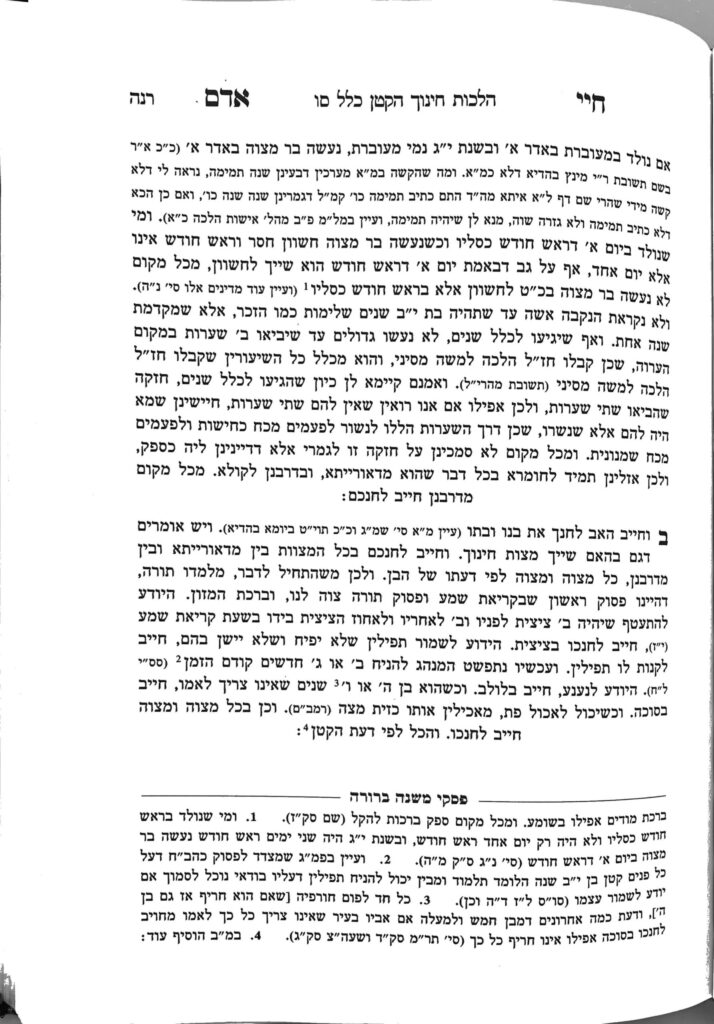We have finished siman 2, in which the Chayei Adam listed some examples of the proper age to begin chinuch in specific mitzvos. We have discussed the examples of lulav, talmud torah and birchas hamazon, and will continue discussing brachos in general.
Rav Shlomo Zalman, ztl, in Sefer Halichos Shlomo, raises the question that if one begins training their child earlier, they will likely not be careful about saying Hashem’s name with the proper thought, nor in appropriate places (such as a bathroom). Nevertheless, he writes that one does not need to take this issue into account when deciding whether to begin training their child.
Regarding kavannah, a young child is at an age where they do not have the proper kavannah. If we pasken mitzvos tzrichos kavannah, we have essentially undermined all of chinuch, because it is impossible to train the child to have the proper kavannah when they first begin to do mitzvos. The Shaagas Aryeh suggests that any impediment which is due to the reality of being a child, and will correct itself as the child grows, is not a lack of chinuch, and therefore we can teach brachos even though they do not yet have the proper kavannah.
When one teaches a child brachos, although we are not allowed to use Hashem’s name in vain, since one is engaged in chinuch, it is not considered in vain, and one may use Hashem’s name. If one is able to teach the child with the appropriate foods in front of them, it is ideal, but one is not required to do so.
In regards to answering amen to a child’s bracha, the Mishnah Berurah writes that one should not answer, because amen was enacted specifically for responding to an actual bracha. Rav Shlomo Zalman suggests that maybe amen is part of the training process, and therefore one may recite it, but concludes that it would be better not to, but rather to encourage the child in another way (such as “good job” or the like). Rav Yitzchak Yaakov Fuchs brings a suggestion from Rav Bentzion Abba Shaul ztl that one can say a pasuk such as baruch hashem leolam amen v’amen silently, and use the amen of the pasuk to respond to the child.
It is important to note that although we have a heter to recite Hashem’s name in this context, once the child is able to recite Hashem’s name after being given a hint by the parent, it is preferable to do so. Similarly, when teaching a new bracha to an older child, who already knows Hashem’s name, there is no heter to actually use Hashem’s name, as they are old enough to understand to recite the shem Hashem when someone prods them with “Hashem”, “Elokeinu” “Ado–”, or the like. Thus, regarding a bar mitzvah boy, there is no heter to practice using the name of Hashem, as they are old enough to understand to translate from “Hashem” to the actual Name. Although some teachers practice with Hashem’s name to avoid an embarrassing situation for the bar mitzvah boy, it is an incorrect practice.
Summary
- When teaching a child brachos, one does not need to be concerned that they will recite Hashem’s name in inappropriate places, nor that they will not have the proper kavannah.
- One is allowed to use Hashem’s name when teaching a bracha if a child is not yet at the age to recite Hashem’s name on their own. However, once the child is old enough to recite Hashem’s name with a hint, the adult is no longer allowed to recite Hashem’s name just for the purpose of chinuch.



